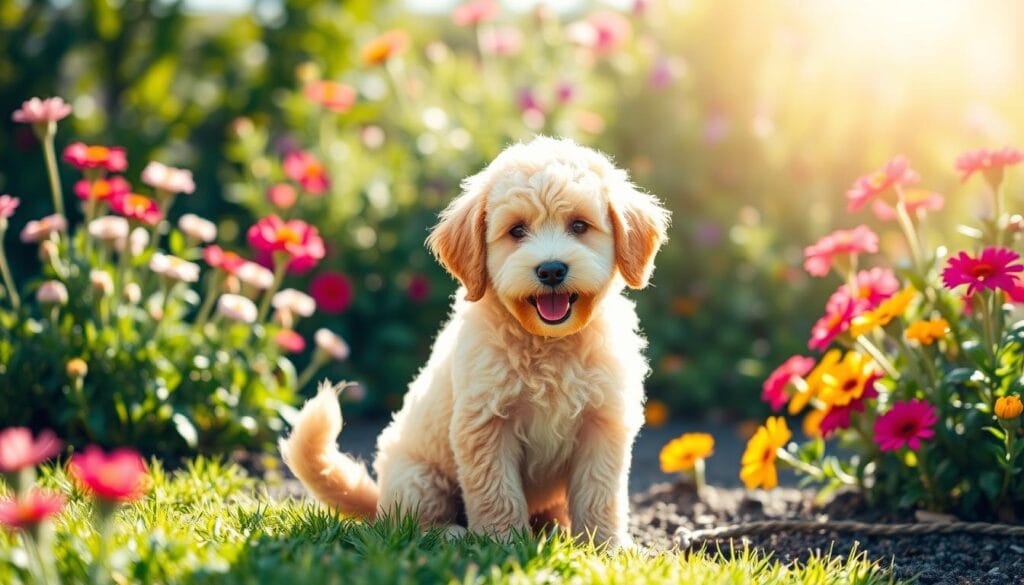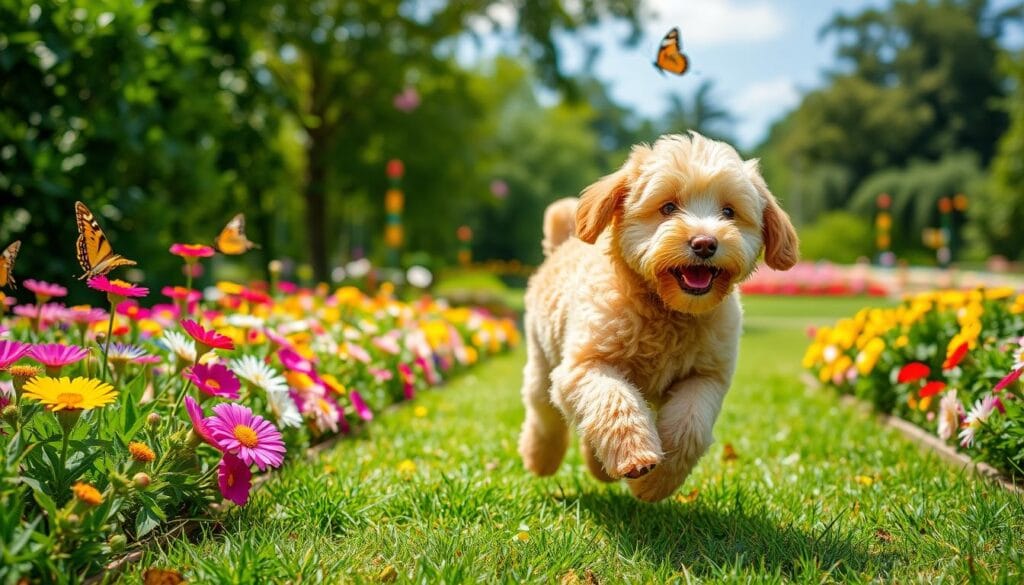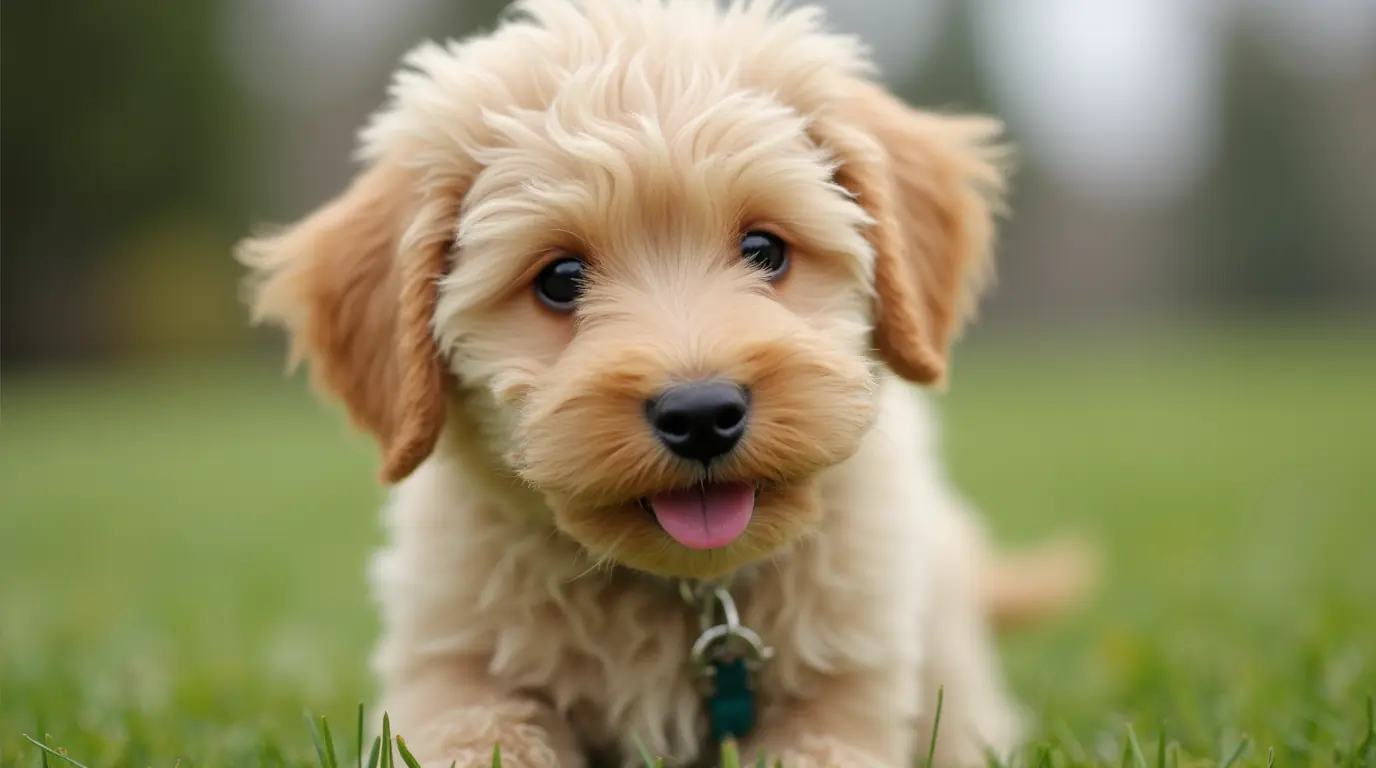Thinking of getting a pet? The Mini Goldendoodle is a great choice! It’s a mix of Miniature or Toy Poodles and English Cream Golden Retrievers. This breed is known for its friendly nature, low-shedding fur, and fun spirit.
In this guide, we’ll dive into the Mini Goldendoodle world. We’ll cover their history, looks, personality, grooming, health, and training. Ready to learn how to keep your Mini Goldendoodle happy and healthy?

Understanding the Mini Goldendoodle Breed History
The mini goldendoodle is a mix of the Golden Retriever and the Miniature Poodle. It’s a smaller version of the Goldendoodle breed. This was made for people who want a smaller, low-shedding pet.
Origins and Development
The mini goldendoodle started in the United States in the 1990s. It was made to be smaller and easier to handle than the standard Goldendoodle. Breeders mixed Golden Retrievers with Miniature Poodles to get a hybrid with great traits from both.
Parent Breeds: Golden Retriever and Miniature Poodle
The Golden Retriever is known for being friendly and loyal. The Miniature Poodle is smart, has a low-shedding coat, and is small. Mixing these two breeds makes a mini goldendoodle that is loyal, smart, and sheds less. They fit well in many homes.
Why the Breed Became Popular
The mini goldendoodle is loved for many reasons. They are friendly, have low-shedding coats, and are good for families with allergies. They also show hybrid vigor, which means they can be healthier and stronger than their parents.
Related: Goldendoodle Lifespan: The Surprising Truth About How Long They Really Live

Physical Characteristics and Size Variations
Mini Goldendoodles are a favorite among dog lovers. They are small, playful, and perfect for living in apartments. They usually grow to be 15 to 20 inches tall and weigh 25 to 35 pounds.
Their height is measured at the withers, and they reach full size by their first birthday. This makes them smaller than standard Goldendoodles, which can be over 21 inches tall and weigh more than 50 pounds.
Mini Goldendoodles come in different coat types like curly, wavy, and straight. Their coats can be of many colors, including cream, gold, red, chocolate, and merle. This variety comes from their Golden Retriever and Miniature Poodle parents.
| Coat Type | Colors |
|---|---|
| Curly | Cream, Red, Chocolate |
| Wavy | Gold, Merle |
| Straight | Dark Brown, Abstract, Parti, Phantom |
Mini Goldendoodles are great for families, especially those with allergies. They are small and have low shedding. This makes them fit well in apartments or bigger homes with yards.
“Mini Goldendoodles are the perfect blend of playfulness and adaptability, making them a delightful addition to any family.”
Mini Goldendoodles are loved for their looks, hypoallergenic qualities, and size. They bring joy and happiness to any home.
Related: How Long Can Your Goldendoodle Lifespan? Everything You Need to Know About Their Lifespan

Temperament and Personality Traits of Mini Goldendoodles
Mini Goldendoodles are known for being playful, loving, and friendly. They are small but strong, standing 13 to 20 inches tall and weighing 15 to 35 lbs. They are smart and easy to train, making them great pets for families.
Intelligence and Trainability
Mini Goldendoodles learn quickly and love to please. They pick up new tricks fast. They do well with training and enjoy learning new things.
Social Nature and Family Compatibility
These dogs love to be around people and can get sad if left alone. But they love being with their family and are very loyal. They are also great at getting along with others and enjoy being in social situations.
Behavior with Children and Other Pets
Mini Goldendoodles are gentle and calm, perfect for families with kids. They are friendly with other pets too, like dogs and cats. They love to play and can do well indoors and outdoors.
The mini goldendoodle temperament and personality make them very popular as family-friendly dogs. They are smart, easy to train, and get along well with everyone. This is why they are loved by so many families.

“Mini Goldendoodles are the perfect blend of intelligence, affection, and adaptability, making them cherished family members in homes across the country.”
Essential Grooming Requirements
Maintaining a mini Goldendoodle‘s coat is key. These hypoallergenic, low-shedding dogs need regular care. This keeps their coat looking great.
Brushing daily with a medium-toothed comb and pin brush is vital. It prevents mats and tangles. Bathing every 7-10 days with gentle dog shampoo keeps their skin and coat healthy. Trimming nails every 3-4 weeks and ear cleaning weekly are also important.
Going to a professional groomer every 6-8 weeks is beneficial. It keeps their coat in top shape. Brushing their teeth daily is also crucial for their health.
Mini Goldendoodles are perfect for those with allergies. The right grooming keeps them looking and feeling great.
“Regular grooming is essential for detecting skin issues or irregularities early on.”
Choose a Teddy Bear Cut or a Lion Cut that fits your lifestyle. A consistent grooming routine keeps your pet healthy and happy. With a bit of effort, your pet will always look their best.
Health Care and Maintenance
Proper healthcare is key for your mini goldendoodle’s well-being. These lovable pups are generally healthy but may face certain inherited conditions. It’s important to watch for these and manage them well.
Common Health Issues
Mini goldendoodles can get health problems from their Poodle and Golden Retriever roots. Issues like hip dysplasia, progressive retinal atrophy, and heart problems can occur. Regular vet visits and tests can catch these early, allowing for quick action and treatment.
Preventive Care Measures
- Feed a balanced diet with proteins and healthy fats to meet their energy needs.
- Ensure at least 30 minutes of exercise daily to keep muscles strong and prevent bad behavior.
- Stay away from too much exercise in hot weather to avoid heat stress from their thick coats.
- Keep up with grooming, like bathing every few weeks and ear cleaning, to keep their coat and skin healthy.
Regular Veterinary Check-ups
Regular vet visits are vital for your mini goldendoodle’s health. These visits help with vaccinations, parasite prevention, and catching health issues early. Don’t forget about dental care, like brushing teeth daily and professional cleanings, for their overall health.
By taking these steps and being proactive with your mini goldendoodle’s health, you can help them live a long, happy, and healthy life.
Training and Socialization Guidelines
Raising a well-behaved mini Goldendoodle starts with early training and socialization. This smart breed loves positive reinforcement. So, start mini Goldendoodle training as soon as you can.
Begin with basic commands like sit, stay, and come. Be consistent and patient when training your mini goldendoodle. Also, sign up for obedience training classes to strengthen your bond.
Puppy socialization is crucial for a mini goldendoodle’s growth. Introduce your puppy to different people, animals, and places. This helps them become confident and flexible. Good breeders know how important socialization is early on.
- Socialization starts at 3 weeks for Goldendoodle puppies.
- From 14 to 20 weeks, Goldendoodle puppies need careful socialization from new families.
- Early Neurological Stimulation (ENS) is key in the first weeks for their health and immune system.
Consistent training and early socialization will help your mini goldendoodle thrive. It will also create a strong bond with you for life.
Exercise Needs and Activity Requirements
Mini Goldendoodles are full of energy and smart. They need regular exercise to stay healthy in body and mind. Aim for 30-60 minutes of activity each day to keep them happy.
Daily Exercise Recommendations
Goldendoodles need 30 to 60 minutes of exercise every day. This can change based on their size. Owners should adjust the routine to fit their dog’s age and energy.
Puppies under one year should avoid hard activities like jogging. This helps prevent joint problems. Adult dogs can handle more intense exercise.
Mental Stimulation Activities
- Interactive puzzle toys that challenge problem-solving skills
- Obedience training sessions to reinforce commands and behaviors
- Participation in canine sports like agility courses or flyball
Outdoor and Indoor Activities
Mini Goldendoodles enjoy both outdoor and indoor exercises. Outdoor activities like walks, hiking, and fetch are great. Indoor games, tug-of-war, and training also meet their needs.
It’s important to be consistent with exercise and mix-up activities. This keeps mini Goldendoodles engaged, prevents boredom, and keeps them healthy. By meeting their needs, owners help their dogs grow into happy, well-rounded companions.
Diet and Nutrition Tips
It’s vital to give your Mini Goldendoodle a balanced diet for their health and long life. Choose high-quality dog food that fits their size, age, and how active they are. Also, watch the portions to avoid obesity, which can cause joint problems and other health issues.
For feeding your Mini Goldendoodle, talk to your vet about the best schedule and amounts. Puppies need 3 to 4 meals a day until they’re 8 to 12 weeks old. Older dogs usually eat 2 meals a day. Switching from puppy to adult food slowly helps avoid stomach problems.
The mini Goldendoodle diet should have lots of protein, healthy fats, and vitamins and minerals. This supports their energy and health. Don’t give them human foods like chocolate, grapes, or onions. If your vet says it’s okay, adding supplements for joint health can be helpful.
Remember, dog nutrition varies with each dog’s growth and needs. Working with your vet and giving a healthy pet food diet ensures your dog stays happy and healthy.
| Feeding Schedule | Meal Frequency | Portion Size |
|---|---|---|
| 8 to 12 weeks old | 3 to 4 meals per day | 1 cup per 15 lbs of body weight |
| 6 to 12 months old | 2 meals per day | Adjust based on weight and activity level |
| 12 months and older | 2 meals per day | Adjust based on weight and activity level |
“Proper feeding and nutrition are essential for the overall health and well-being of Mini Goldendoodles. Consulting with a veterinarian is key to ensuring your pup receives the right balance of nutrients to thrive.”
Conclusion
Mini Goldendoodles are loving and smart companions. They can fit well into many family settings. It’s important to give them the right care, like grooming, exercise, training, and health checks.
Before getting a Mini Goldendoodle, look for a reputable breeder. They should focus on the health and personality of their dogs. Knowing the time and money needed for a Mini Goldendoodle is key. With the right care, they can bring lots of joy and companionship.
Mini Goldendoodles are great for many reasons. Their hypoallergenic coats, adaptability, and loving nature are just a few. To have a happy Mini Goldendoodle, focus on responsible pet care and finding a good breeder. With the right effort, they can become beloved family members.
FAQ
What is a Mini Goldendoodle?
A Mini Goldendoodle is a mix of a Miniature or Toy Poodle and an English Cream Golden Retriever. They are known for being friendly, having low-shedding coats, and lots of energy.
What are the typical size and characteristics of a Mini Goldendoodle?
Mini Goldendoodles weigh 20-35 pounds and are 16-20 inches tall. Their coats can be wavy, curly, or straight. They come in many colors like gold, red, and dark brown, and patterns like abstract and phantom.
What is the temperament of a Mini Goldendoodle?
Mini Goldendoodles are playful, affectionate, and friendly. They are smart and easy to train, making great family pets. They love to be around people and get along well with kids and other pets.
What are the grooming requirements for a Mini Goldendoodle?
Mini Goldendoodles need regular grooming to keep their coat healthy. Brush them daily, bathe every 7-10 days, and get professional grooming every 6-8 weeks. Their coat is low-shedding and hypoallergenic, good for people with allergies.
What are common health concerns for Mini Goldendoodles?
Mini Goldendoodles might get hip dysplasia, progressive retinal atrophy, and skin issues. Regular health checks and preventive care are key. A balanced diet, exercise, and vet visits help manage these conditions.
How much exercise do Mini Goldendoodles need?
Mini Goldendoodles need at least 30-60 minutes of activity daily. This includes walks, playtime, and games. Both outdoor and indoor activities are important for their health.
What should I feed a Mini Goldendoodle?
A balanced diet is vital for Mini Goldendoodles. Choose a high-quality dog food that fits their size, age, and activity level. Watch portion sizes to avoid obesity. Always provide fresh water and avoid harmful human foods.
How do I train a Mini Goldendoodle?
Start training Mini Goldendoodles early with basic commands. Positive reinforcement works well with this smart breed. Be consistent, patient, and socialize them early. Professional training classes can also help.

